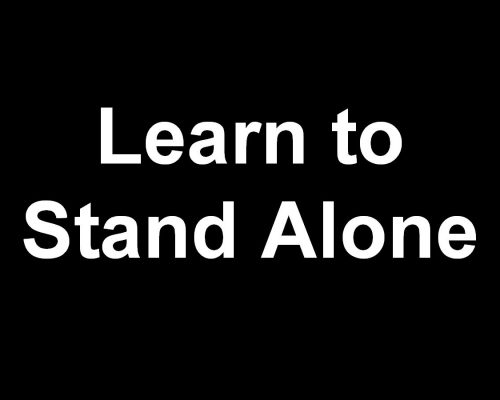Condemning Sin–Are We All Hypocrites?
One of the most common accusations launched at Christians is that of "hypocrisy." Why is that?
Well, partly, it is because all of us have sinned. And to many people, if we commit sin, then turn around and point out the fact that others are committing that sin, it sounds like hypocrisy.
Of course, everything depends on how we see our own sin. If we acknowledge it as sin, recognize that we blew it, realize that the sin we committed has done great harm, repent of it, and receive God’s cleansing and forgiveness, that’s one thing. If we rationalize our behavior, excuse ourselves, and deny that the sin was really sin at all, that’s something else entirely.
It would be possible to put together a long list of sins. And, if we carefully went down that long list of sins, every Christian would, with great embarrassment, have to say, "Yeah, I’ve done that. Yeah, I was guilty of that one. Yeah, I blew it on that one too." We’ve sinned a lot. We’ve had to be forgiven for a lot!
By the way, that’s one reason we love Jesus so much! Jesus said it: "Wherefore I say unto thee, her sins, which are many, are forgiven; for she loved much: but to whom little is forgiven, the same loveth little." (Luke 7:47)
So how can Christians have to gall to tell the rest of the world that they shouldn’t do these things! Isn’t that the epitome of hypocrisy?
Well, first of all, the primary message that Christians have to share is not "You all need to stop sinning!"
Our primary message is more like, "Look, all of us have blown it. And our only hope is the forgiveness and cleansing that we receive through our Lord Jesus Christ." Everything changes (including our attitude about sin) when we have a personal relationship with our Lord Jesus Christ.
Yet, we still urge people (including ourselves) not to sin. Why?
Because we believe that our Creator has revealed to us, in His Word, those behaviors that bring about hurt and death and destruction. Some things that cause those things are obvious to everyone. You don’t even need a Bible to realize it. If I take a gun and go to a mall and start shooting people, everyone realizes that I have done a great evil and a caused great destruction. Other sins are more subtle and their effects more long range. Their damage to others may be much less obvious.
Sometimes people think that if a Christian says, "God says that behavior is wrong. It’s going to hurt you and other people," then it is an act of condemning the person. In fact, as incongruent as it may seem to some people, it is entirely possible to deeply love people… to accept them as created in God’s image… to even recognize and accept the fact that God gives them the freedom to choose to sin… while at the same time warning them that their behavior is destructive. Even when it means acknowledging that we have been guilty of the same sin! In fact, logically, it is not loving to refuse to warn others of behavior that is destructive. (Much as it would be unloving to decline to warn motorists, on a dark rainy night, of a bridge out ahead.)
Of course, If some people believe that what God calls "sinful" behavior is actually "virtuous" behavior, the charge of "hypocrisy" is especially likely. This is when we hear the oft spoken words, "Who are you to tell me how to live my life?"
And what do we do when we all have different value systems? Some of us trust the Scriptures as God’s revealed truth. Others trust their own common sense, feelings, intellect, etc. What right do those who trust Scriptures have to try to "impose" their beliefs on others (by enacting laws against some behaviors)?
Those are good questions!
For answers, while we Christians always start with Scripture, sometimes we may have to do a bit more thinking and a bit more research. And sometimes it’s a little more complicated.
For example, most Christians will agree that the worst sin of all is to reject the Lord Jesus Christ. Yet, to enact a law that people must accept that Jesus Christ is Lord is unthinkable! Why? Because it is a decision of the will that must be made individually, person by person, and that cannot be coerced. Again, most Christians agree that it is sin to neglect to read the Bible and pray and worship. We even believe that these things result in better relationships with other people. We even believe that these things, if practiced by the entire population, would result in a huge benefit to society. But, again, we recognize that these things cannot be coerced. They must be done out of personal love for Christ.
Christians also believe that it is sin to lust after someone or something that doesn’t belong to us. We believe that it is sin to hate people. And, while we may urge others not to commit these sins, we realize the foolishness of trying to enact laws over people’s thought life! (Although, amazingly, this seems to be happening with "hate crime" legislation! But we’ll save that issue for another post!)
But there are those times when not only the Bible, but also evidence collected from studying people’s lives, seems to make it clear that some behaviors are destructive to the lives of those who do them, and/or to the lives of others within society.
So for example, very few (at least at this point in time) would argue that parents should have the right to kill their children! (At least the born ones. It seems amazing to me that I had to add that sentence.) Most everyone can see the "logic" in that. Most everyone can see the damage. But one might imagine a parent, perhaps very poor, perhaps very sick, perhaps very depressed, with children who are perhaps very sick, who might think, "You know, my kids would be better off dead than alive." To protect those children, we certainly believe in laws against such things.
Other examples are much more controversial. A current example would be the issue of "same-sex marriage." Proponents tend to see it as an issue of homosexuals getting to enjoy the same rights as heterosexuals. Many Christians, however, say, "Hold on! Not only is this a Biblical issue, it is also an issue that has the potential to do great damage to people’s lives! Not only will legally "normalizing" homosexual behavior hurt homosexuals (by encouraging them to continue in behavior that is destructive), but it will tend to draw others into destructive behavior too.
(You may wish to read Finding a Christian Attitude toward Homosexuality and What Does the Bible Have to Say about Homosexuality? Both articles are on our website.)
Are there Christians who have committed homosexual sin? Of course! Some Christians battle temptations to commit homosexual sin over a period of many years. Just like others battle temptations to lie, or to commit adultery, or to explode in anger, etc. Do Christians sometimes yield to the flesh and commit these sins? Sadly, yes. Does that mean that they are hypocrites because they vocally call such behavior sin? No, it means they yielded to the weakness of the flesh. If no one ever condemned sin because it happened to be a sin they had been guilty of committing, it wouldn’t be long until no sin would ever be condemned!
Of course, we certainly would be hypocritical if we condemned the sins of others while at the same time excusing our own. Over and over Jesus called the Pharisees hypocrites for this very reason.
Finally, let me underline this point… Condemning sin is not the same as condemning people! The Christians who are most effective at condemning sin are the ones who are not only quick to admit our own sins, but also most effective at communicating great love for others who are committing those sins.
Who does that remind you of? I hope it reminds you of Jesus! After all, He is not only our Lord and Savior, He is our model! We cannot reach His sinless perfection in this life, but we must strive to imitate Him… loving people as we confront them with the terrible consequences of their sins.
P.S. Today (12/23/08) my Daddy would have been 82 years old, had he lived. It’s his birthday. He died at what now seems to me to be the terribly young age of 57. Perhaps, if someone had been more effective at communicating to him the destructive power of the sin of smoking cigarettes, he would have enjoyed more years of life. Yes, he really knew the truth about cigarettes. And yes, he was responsible for his own decisions. But many have testified with great joy that they have abandoned sin at the urging of someone who loved them enough to confront them.







-
Tagged 2021, Courage, persecution, spiritual warfare, Standing Firm